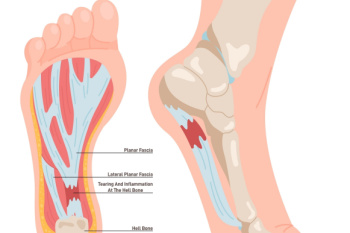Connect With Us
Blog

Pregnancy brings many physical changes, and the feet are no exception. As the body adapts to support added weight and shifting posture, the arches may flatten, and swelling can increase. These changes can lead to foot pain, instability, and discomfort with everyday activities. Wearing supportive and properly fitting shoes during pregnancy is essential for maintaining balance and preventing strain on the feet, ankles, and lower back. Footwear with good arch support, cushioning, and a wide toe box can help accommodate changes in foot size and shape. Choosing the right shoes can also reduce the risk of falls and improve overall mobility. If you are pregnant and are experiencing foot pain, it is suggested that you visit a podiatrist who can guide you toward selecting supportive shoes that are right for you.
Pregnant women with swollen feet can be treated with a variety of different methods that are readily available. For more information about other cures for swollen feet during pregnancy, consult with Dr. Thong V. Truong from California. Our doctor will attend to all of your foot and ankle needs.
What Foot Problems Can Arise During Pregnancy?
One problem that can occur is overpronation, which occurs when the arch of the foot flattens and tends to roll inward. This can cause pain and discomfort in your heels while you’re walking or even just standing up, trying to support your baby.
Another problem is edema, or swelling in the extremities. This often affects the feet during pregnancy but tends to occur in the later stages.
How Can I Keep My Feet Healthy During Pregnancy?
- Wearing orthotics can provide extra support for the feet and help distribute weight evenly
- Minimize the amount of time spent walking barefoot
- Wear shoes with good arch support
- Wear shoes that allow for good circulation to the feet
- Elevate feet if you experience swelling
- Massage your feet
- Get regular, light exercise, such as walking, to promote blood circulation to the feet
If you have any questions please feel free to contact our office located in Chico, CA . We offer the newest diagnostic and treatment technologies for all your foot and ankle needs.

Plantar fasciitis is a well-known cause of heel pain, often felt as a sharp, stabbing sensation with the first steps in the morning or after periods of rest. The condition results from inflammation of the plantar fascia, a thick band of tissue that connects the heel to the toes. While it can be persistent, several strategies may help reduce discomfort and promote healing. Stretching exercises for the calf muscles and plantar fascia can improve flexibility and reduce strain. Wearing supportive shoes with good arch support and cushioned soles is essential for daily comfort. Custom orthotics can also help distribute pressure more evenly across the foot. Using anti-inflammatory medications may ease pain in the short term. However, if you are experiencing ongoing heel pain, it is suggested that you see a podiatrist for a proper diagnosis and appropriate treatment.
Plantar fasciitis can be very painful and inconvenient. If you are experiencing heel pain or symptoms of plantar fasciitis, contact Dr. Thong V. Truong from California. Our doctor can provide the care you need to keep you pain-free and on your feet.
What Is Plantar Fasciitis?
Plantar fasciitis is the inflammation of the thick band of tissue that runs along the bottom of your foot, known as the plantar fascia, and causes mild to severe heel pain.
What Causes Plantar Fasciitis?
- Excessive running
- Non-supportive shoes
- Overpronation
- Repeated stretching and tearing of the plantar fascia
How Can It Be Treated?
- Conservative measures – anti-inflammatories, ice packs, stretching exercises, physical therapy, orthotic devices
- Shockwave therapy – sound waves are sent to the affected area to facilitate healing and are usually used for chronic cases of plantar fasciitis
- Surgery – usually only used as a last resort when all else fails. The plantar fascia can be surgically detached from the heel
While very treatable, plantar fasciitis is definitely not something that should be ignored. Especially in severe cases, speaking to your doctor right away is highly recommended to avoid complications and severe heel pain. Your podiatrist can work with you to provide the appropriate treatment options tailored to your condition.
If you have any questions please feel free to contact our office located in Chico, CA . We offer the newest diagnostic and treatment technologies for all your foot and ankle needs.

